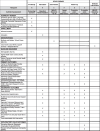Mothers and Babies Virtual Group (MBVG) for perinatal Latina women: study protocol for a hybrid type-1 effectiveness-implementation randomized controlled trial
- PMID: 39261967
- PMCID: PMC11391742
- DOI: 10.1186/s13063-024-08423-z
Mothers and Babies Virtual Group (MBVG) for perinatal Latina women: study protocol for a hybrid type-1 effectiveness-implementation randomized controlled trial
Abstract
Background: Immigrant Latinas (who are foreign-born but now reside in the USA) are at greater risk for developing postpartum depression than the general perinatal population, but many face barriers to treatment. To address these barriers, we adapted the Mothers and Babies Course-an evidence-based intervention for postpartum depression prevention-to a virtual group format. Additional adaptations are inclusion of tailored supplemental child health content and nutrition benefit assistance. We are partnering with Early Learning Centers (ELC) across the state of Maryland to deliver and test the adapted intervention.
Methods: The design is a Hybrid Type I Effectiveness-Implementation Trial. A total of 300 participants will be individually randomized to immediate (N = 150) versus delayed (N = 150) receipt of the intervention, Mothers and Babies Virtual Group (MB-VG). The intervention will be delivered by trained Early Learning Center staff. The primary outcomes are depressive symptoms (measured via the Center for Epidemiologic Studies-Depression Scale), parenting self-efficacy (measured via the Parental Cognition and Conduct Towards the Infant Scale (PACOTIS) Parenting Self-Efficacy subscale), and parenting responsiveness (measured via the Maternal Infant Responsiveness Instrument) at 1-week, 3-month, and 6-month post-intervention. Depressive episodes (Structured Clinical Interview for DSM-V- Disorders Research Version) at 3-month and 6-month post-intervention will also be assessed. Secondary outcomes include social support, mood management, anxiety symptoms, perceived stress, food insecurity, and mental health stigma at 1-week, 3-month, and 6-month post-intervention. Exploratory child outcomes are dysregulation and school readiness at 6-month post-intervention. Intervention fidelity, feasibility, acceptability, and appropriateness will also be assessed guided by the Reach, Effectiveness, Adoption, Implementation, Maintenance (RE-AIM) framework.
Discussion: This study will be one of the first to test the efficacy of a group-based virtual perinatal depression intervention with Latina immigrants, for whom stark disparities exist in access to health services. The hybrid effectiveness-implementation design will allow rigorous examination of barriers and facilitators to delivery of the intervention package (including supplemental components) which will provide important information on factors influencing intervention effectiveness and the scalability of intervention components in Early Learning Centers and other child-serving settings.
Registration: ClinicalTrials.gov NCT05873569.
Keywords: Group intervention; Intervention; Latina; Postpartum depression; Prevention; Telehealth.
© 2024. The Author(s).
Conflict of interest statement
The authors declare that they have no competing interests.
Figures
References
-
- Moses-Kolko EL, Roth EK. Antepartum and postpartum depression: healthy mom, healthy baby. J Am Med Womens Assoc (1972). 2004;59(3):181–91. - PubMed
Publication types
MeSH terms
Associated data
Grants and funding
LinkOut - more resources
Full Text Sources
Medical
Miscellaneous


